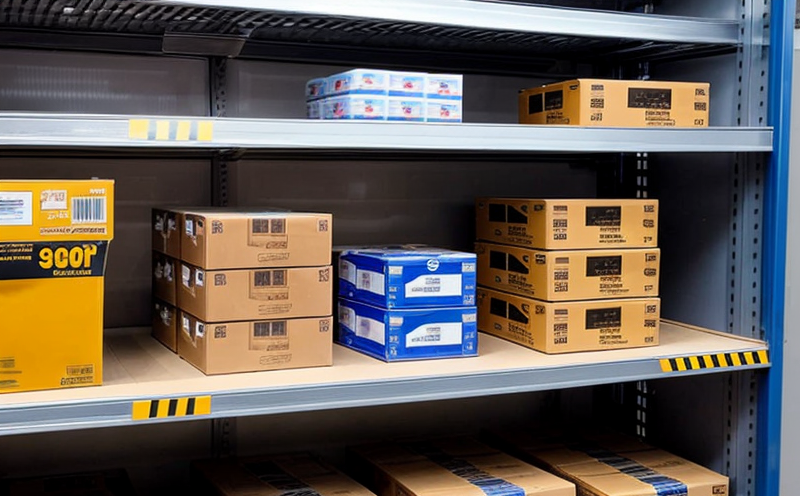ASTM D5733 Tongue Tear Resistance of Packaging Materials
The ASTM D5733 test method is a critical standard used to evaluate the tongue tear resistance of packaging materials. This test assesses the ability of a material to resist tearing when subjected to stress applied along its longitudinal axis, simulating real-world scenarios such as opening a package or handling it during transport.
The ASTM D5733 test is particularly important for medical device manufacturers who need to ensure that their packaging can withstand the rigors of distribution and use without compromising the integrity of the device. The test involves placing a specimen under tension until it tears along its length, and measuring the force required to initiate this tear. This measurement helps determine how the material will perform in various handling conditions.
The testing process begins with selecting appropriate specimens that accurately represent the packaging materials used for medical devices. These samples are then prepared according to ASTM D5733 specifications, ensuring uniformity across tests. The test apparatus typically includes a tensile tester capable of applying precise loads and measuring the force required to initiate tearing.
The results from the ASTM D5733 test provide valuable insights into the mechanical properties of packaging materials. For instance, it helps identify potential weak points in the design or manufacturing process that could lead to premature failure during use. By understanding these weaknesses early on, manufacturers can make necessary adjustments to improve both performance and safety.
It is essential for quality managers and compliance officers to stay updated with current testing methods like ASTM D5733 as they play a crucial role in ensuring product integrity throughout the supply chain. R&D engineers also benefit from knowing such standards since they often design innovative solutions based on empirical data obtained through rigorous testing procedures.
Moreover, this test supports regulatory requirements set forth by organizations such as the FDA. Compliance with these tests ensures that medical devices meet stringent quality control measures before being released into the market. As a result, patients receive products that are not only effective but also safe for long-term storage and transport.
Understanding the nuances of ASTM D5733 is vital for those involved in procuring materials intended for use in packaging sensitive medical devices. By selecting suppliers who adhere to these stringent testing protocols, organizations can ensure they are receiving high-quality products capable of meeting all necessary specifications.
In summary, the ASTM D5733 test method offers a reliable way to assess tongue tear resistance in packaging materials used within the medical device industry. Its application ensures that packages remain intact during handling and transport while protecting valuable contents inside. This contributes significantly towards maintaining overall product quality standards across the entire supply chain.
Applied Standards
| Standard Name | Description |
|---|---|
| ASTM D5733-18a | This standard specifies the procedure for determining the tongue tear resistance of packaging materials. It provides detailed instructions on how to prepare specimens, apply tension, and measure the force required to initiate a tear. |
Why Choose This Test
The ASTM D5733 test is chosen for its accuracy in measuring the tongue tear resistance of packaging materials. It allows manufacturers to evaluate how their products will perform under stress, which is crucial when dealing with sensitive medical devices that require robust protection during transportation and storage.
One significant advantage of this test lies in its ability to detect potential flaws early on in the development stage. By identifying weak points in design or manufacturing processes through rigorous testing, companies can address issues before they become major problems later down the line.
The results generated by ASTM D5733 provide valuable information about the mechanical properties of packaging materials. This knowledge enables manufacturers to make informed decisions regarding material selection and process optimization. Furthermore, it supports regulatory compliance efforts aimed at ensuring product safety and efficacy.
For quality managers and compliance officers responsible for overseeing various aspects of production and distribution, adherence to ASTM D5733 ensures consistent adherence to industry best practices. This not only builds consumer trust but also helps maintain a positive reputation among stakeholders.
R&D engineers benefit greatly from this test as well since it provides empirical data that can be used to innovate new designs or improve existing ones. With the ever-evolving nature of technology and patient needs, staying ahead requires continuous improvement, which starts with robust testing methodologies like ASTM D5733.
Quality and Reliability Assurance
- Measuring the force required to initiate a tear in packaging materials.
- Evaluating the resilience of packaging against physical stressors during transportation and storage.
- Ensuring consistent performance across different batches or suppliers.
- Detecting potential weaknesses in design that could lead to premature failure.





